Sometimes there's a right answer, sometimes you sit by a creek, and sometimes they're the same thing
Walking (& Sitting) composition
Note: I’ve created one extra section in this newsletter where I’m collecting references and resources on all aspects of ownership, the commons, and commodification. It’s not something I’ll email out, but I’ll add to it regularly and it’s there for your use. Feel free to share, send suggestions, and ask questions.
Important regarding subscriptions: Three real-life friends who are paid subscribers to On the Commons have told me that their payments are showing up as coming from Medium, not Substack, which obviously looks fraudulent. Both Substack and Medium use Stripe for payments. I intermittently contract with Medium, so my account has both platforms on it—the payments are still for Substack, but for some reason are being labeled Medium. I’m trying to resolve this issue with Stripe. It seems like a coding issue, and if it’s affected you, I apologize. Fingers crossed a real human works there, somewhere, and can figure it out.
If they can’t fix the problem, I’m not sure what the best thing to do is. I have Venmo, I guess, and PayPal, and a post office box . . .
Or we could just abolish capitalism. Can’t take that long if we all team up, can it?
When I moved back to my hometown—secondary hometown, I call it, where I graduated high school—almost ten years ago, I was moving back for the community. The pace of parenting expectations on the rural fringes of New York City’s orbit, where our kids were born, was exhausting, and I’d been homesick for Montana for 20 years, since I first left for college. I didn’t feel alive anymore, going through the motions of working and parenting and trying to connect with a place I didn’t understand that also had a hell of a lot of poison ivy and humidity and Lyme disease-bearing ticks. So I came home. It wasn’t as easy or straightforward or quick as that, but it’s one of the things I’m most grateful for, that I got to make that choice.
Every time I go on a hike with a friend or pick huckleberries or drive some unnamed gravel road, there’s this flood of gratitude that’s almost absurd. Like gratitude with a thick buttercream layer of extra gratitude. I get to live here, and walk these mountains. I get to slow-breathe the smell of a trail covered in sun-warmed pine needles, and the sharp scent of those same needles in the spring when winter hasn’t yet let go. I can take my kids places where we watch meteor showers with no discernible light pollution. I worry about mountain lions and my aging knees, and spend November hours when I’m meant to be hunting watching chickadees deep in the woods instead.
High-mountain lakes the same indigo-blue of sky the moment it’s losing the last of the day’s sunlight; hillsides smothered in beargrass and grouse whortleberry—how could I not feel gratitude?
Stand on a mountaintop where the air is silent and a hawk soars overhead and look across to ridges draining into gouged-out tracks; imagine what they’re like as spring thaw sets in. Think about the kind of water-force it takes, over how many years, to scour a mountainside into the form of a pastry blender.
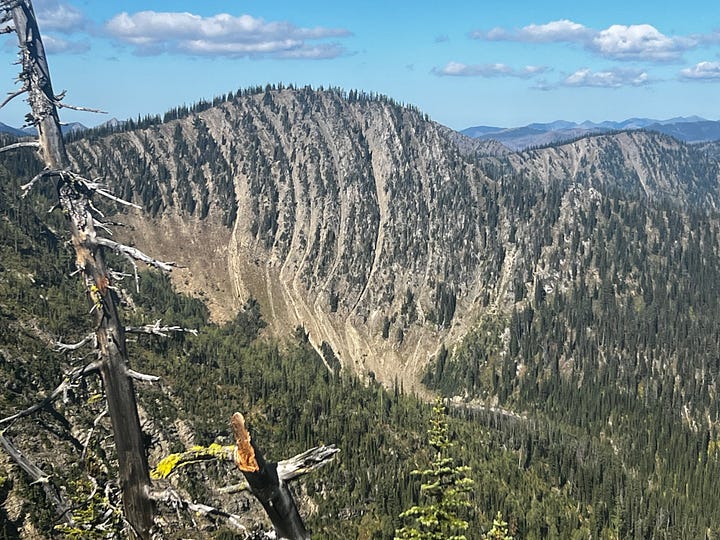
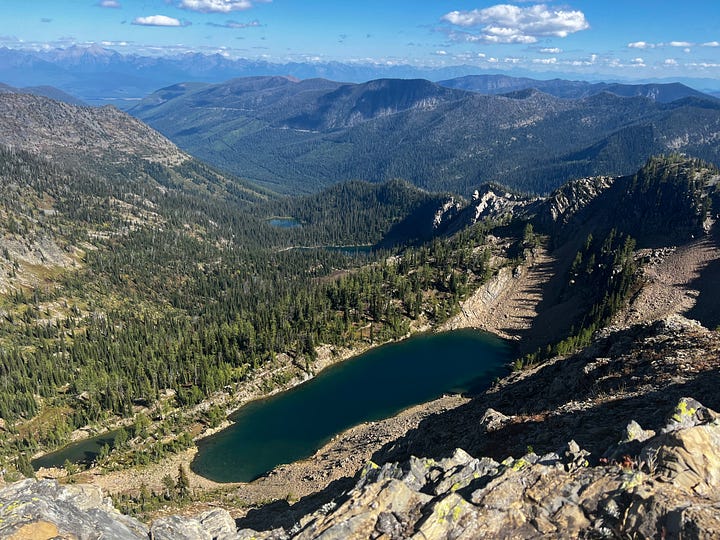
I will never stop being grateful for it, and never, I hope, stop remembering that I’m a visitor here. I love it and hope to never leave, and none of it is mine or ever will be.
I spent most of last weekend in East Glacier at the annual Gathering of the Glacier-Two Medicine Alliance, where instead of talking about further legal strategies to appeal last year’s upholding of the last remaining oil lease in the Badger-Two Medicine area, everyone got to celebrate the recent announcement that the lease was being retired.
This really is a huge thing to celebrate, especially for the Blackfeet Nation. It’s not often that anti-extraction efforts get a win like this, and in such a place, too. It was an honor to be present as elders spoke of their families’ relationship with that land and the waters that flow out of it.
From the broader perspective of private property law and the damage it causes, the retirement isn’t an unadulterated success. One point of the settlement stands out: the agreement specifies that, in return for the leaseholder accepting $2.6 million to relinquish their claim, the interested parties drop their appeal against last year’s court decision upholding the lease. If you read that legal opinion—from a D.C. district court judge who’s been favorable to the leaseholders from the outset—you’ll understand why the lawyers for the leaseholders are pleased with this outcome. The opinion defends this kind of extractive private property right on public lands, and on sacred lands, as long as the right is legally granted. Whether it happens in the Badger-Two Medicine someday or elsewhere, that right is currently in good standing in U.S. law.
It’s easy to hide the implications inside legalese, but if you read, say, this one line:
“NEPA and NHPA impose procedural requirements with which government agencies must comply before acting, but neither requires that the agency elevate the preservation of environmental or historical resources above other priorities,”
you have, in a nutshell, the problem with the bent of current property law, which is that no other claim—no matter how ancient, even that of life itself—can take precedent over the private right to extract and make a profit. It’s one of the many reasons, I assume, that the attorneys for the leaseholder were happy with the outcome and said that,
“We think Judge Leon’s opinion at the district court will be a powerful precedent for years to come.”
Law, as I’ve written before, is a reflection of the dominant society’s values at any given time. It’s a story we’re told about what matters. Right now a strong lean into absolute private property rights is a narrative that runs roughshod over ever-increasing aspects of life.
John Murray, Blackfeet Tribal Historic Preservation Officer and someone who’s by now probably been involved in the fight against these leases longer than anyone else alive, spoke at the Gathering of more recent efforts to declare the entire area a National Monument and therefore forever off-limits to oil, gas, and mineral extraction.
That’s not a reliable plan, he said. We never know who’s going to be the next president, or the one after that. He didn’t mention Bears Ears National Monument in Utah and Trump’s reduction of its boundaries to accommodate oil and gas industry preferences, but I’m sure everyone was thinking of it.
The only right answer, said Murray, is to give the land back to the Blackfeet Nation.
At those words, a shock-flash went through the room. I don’t know what a shock-flash is—I just made it up—but I can tell you what it felt like because I was sitting right there. It was like a stiff wind, made of energy, that lasted for less than a second and hit right in the heart as well as the head. I would not have been surprised to see people’s hair standing on end.
The proposal to return the Badger-Two Medicine to the Blackfeet Nation has been around for a few years. I had a conversation last year with someone—another white person—sympathetic to everything regarding protection of the Badger-Two Medicine except, perhaps, hesitation over this one last step.
“We might not be able to do what we just did,” this person said, indicating the hike we’d just been on to view the then-proposed drill site. Not in a defensive way, more that they’d never considered it seriously before and were trying to get their head around it. “We might not be allowed in.”
“That shouldn’t really be up to us, should it?” I answered, thinking of the vast miles of stolen now-Montana land bent under barbed wire fencing and “Private Property” signs, of broken treaties and how little settlers—including me—understand of what Land Back means, much less of sovereignty.
Settler resistance to Land Back is impossible to disentangle from all aspects of colonialism itself. In a 2022 podcast episode discussing the movement to return the Badger-Two Medicine to the Blackfeet Nation, a law professor said that the idea of returning land “can present some real challenging political determinations for Congress and for others who may see the interests that have developed in public lands as too important to be disturbed,” leading the co-host to explain that,
“Public lands are a really, really big deal, especially in the West. Businesses like outfitters, guiding services, equipment retailers, they all rely on access to these public lands. Counties with big areas of federally owned land, they get payments from the federal government, so there’s also public funding at stake.”
It comes down, once again, to the interests of capital, and the continuing legacy of the Doctrine of Discovery. How this perspective views public versus private land and property rights has differences of degree but not always of kind.
That doesn’t mean everyone running a business dependent on public lands access is a bad person, or selfish, or doesn’t care about the land. It does mean that a society’s values regarding relationship with land, water, wild animals, trees, wild berries, . . . is dictated by interests perhaps adjacent to but still dominant over the interests of all other life, including those of the people from whom nearly everything was stolen. That dominance, by its nature, is incapable of giving the only right answer possible. Maybe that was the shock-flash that went through the room: dominance getting a jolt.
Late on Saturday, the Gathering symbolically burned copies of the oil lease in a firepit. The Blackfeet Rawhide Singers sang a song for and of the Badger-Two Medicine as John Murray danced around the fire and placed the first copy on the flames. Everyone was given a stake to burn and Sharpies to write messages. I slunk back into the shade as the drumbeat and song wove their way into my memories of working trail crew along and sleeping next to North Birch Creek in the Badger-Two Med a few weeks ago, and wept a bit. I don’t think I’ve cried in public since I was about 14 years old.
On my way home, I stopped at a creek I’m fond of, near a trailhead leading into the Bob Marshall Wilderness. The parking lot was empty of other cars or people. Last year when I’d camped there, the creek had held a delightful number of cylindrical caddisfly shells constructed from gravel about the size of a sesame seed. I looked for them but it was too late in the year.
The creek ran cold across my bare feet, its sound and movement and chilly reminders of snowmelt all I really need in this world to ground myself in what’s real, and what matters. I sat there letting my feet go numb and the sound run through me, September’s late afternoon sunlight filtering through the aspen trees to glance off the water.
I don’t even know what to call that sound—a trickle, a ripple, a slow rush?
Sometimes the right answer is an action. Sometimes it’s a change in policy, or in culture. And sometimes it’s simply being, sitting there by a creek reminding yourself what it feels like to be alive, in a place you love. It’s asking questions of belonging and responsibility, and struggling with your own place in the world.
That sound is all of life to me. I could have sat there forever, grown cold and hungry, but I never for a moment would have felt alone.
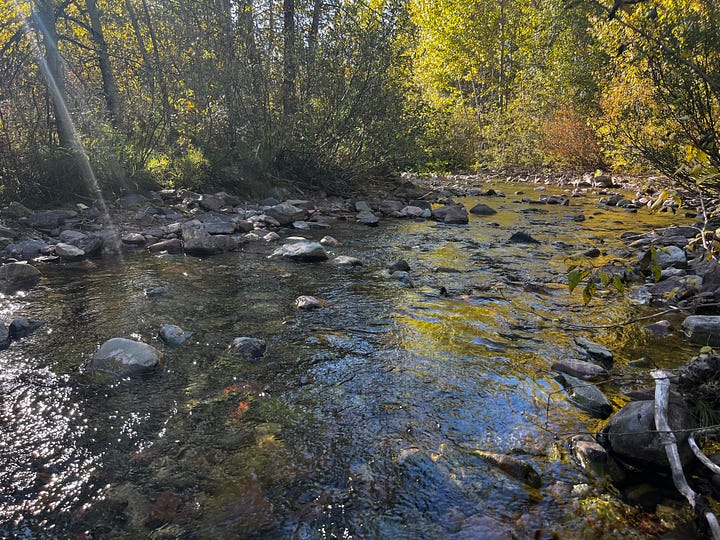
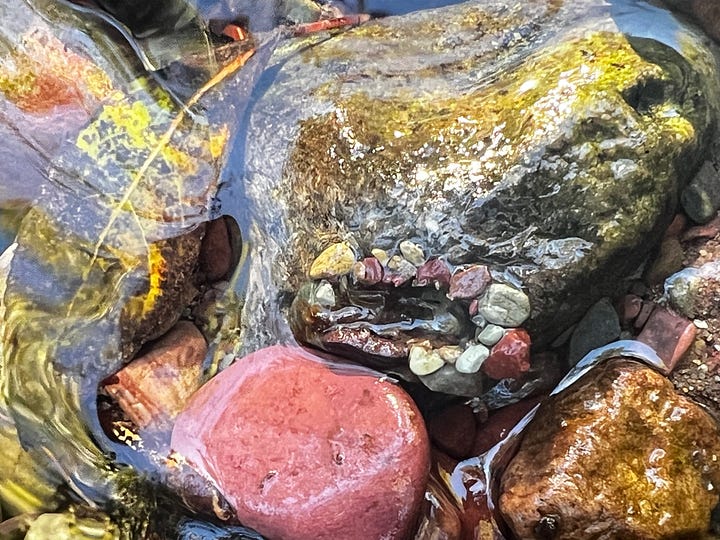

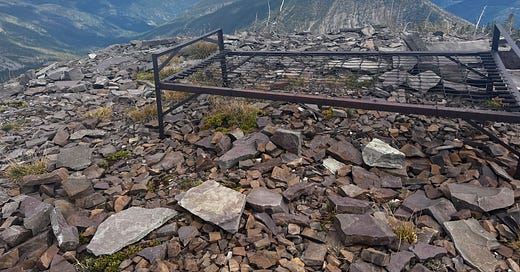



“Law, as I’ve written before, is a reflection of the dominant society’s values at any given time.” And a reflection of the masses of the dominant society’s willingness to fucking pay attention … which is a value of sorts too, I suppose. Understandable, given the mighty weight of capital directed toward distraction and obfuscation, but still, it pisses me off. It’s all going on right in front of our noses!
I was at a discussion in Missoula re: the leases years ago in the fading days when the Obama administration was still running the show and there was talk then of assigning the Badger Two national monument status. Tribal representatives were vehemently opposed then and I hope they continue to hold the line. The only answer is #landback. As for people wringing their hands over access when the tribe is returned what is and has always been rightfully theirs (even if via a concept utterly foreign to most of our ideas of what “theirs” even means), I pay $100/year to buy a conservation license from the CSKT to access their lands for recreational purposes, including the tribal wilderness. Hard to imagine the Blackfeet doing anything differently. Some sites might be off limits (Chief Mountain, in GNP, comes to mind, which they should also absolutely have back and limit access to) but that isn’t up to us, as you say.
Anyway, thank you for sharing your love for this place, Antonia. It is inspiring. ❤️
Sorry that the legalities aren't in nature's favour. Here in the UK the license for an open cast mine expired last year and the miners... kept mining. Enter confusion about the void of enforcement. More positively, elsewhere in the world rivers have been given legal rights.